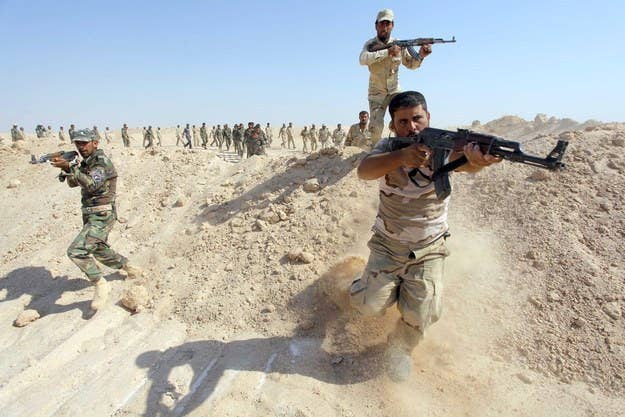
WASHINGTON — Congress will not vote on whether President Obama has the authority to conduct indefinite air strikes against ISIS, which a handful lawmakers have attacked the president for not pursuing.
But the open secret is Congress doesn't want to vote on the issue.
Lawmakers don't want to be anywhere near an on-the-record vote to authorize military action in Iraq or Syria, part of a political calculation with a key election two months away — and another election in 2016 when the military action might have succeeded or failed.
"There are a lot of members who'd just rather just not vote on this and let the president to shoulder the [political] weight of taking us to war," Democratic Rep. Adam Schiff said Tuesday. Schiff is one of a handful of lawmakers who has pushed for a vote this month on a new Authorized Use of Military Force legislation to cover the administration's campaign against ISIS.
A senior Republican aide agreed, arguing that if Congress is going to pass a new AUMF, it'll likely take the White House taking the lead — and thus the political heat in 2014 and 2016 — by proposing some sort of new authorization. "They're going to have to get pregnant with this first," the aide said.
The perils of a vote for lawmakers are clear: Giving Obama authority could be a major liability in future elections; Hilary Clinton famously took major heat during the 2008 presidential campaign for her support of the Iraq and Afghanistan wars. If Congress failed to pass authorization and a major attack were to happen in the homeland, lawmakers could see an even more severe backlash.
Outside of the vote, lawmakers have plenty of opinions on the White House's war against ISIS. House Majority Leader Kevin McCarthy says he's "not convinced this train and equip effort will change the balance of power on the ground any time soon, and I believe this approach comes with great risks," while Rep. Tulsi Gabbard worries arming moderate Syrian rebels will lead to the overthrow of dictator Bashar Assad, which could further destabilize the region. "Voting to support this proposal is actually a vote to overthrow Assad," she said, "because overthrowing Assad is the primary objective of the so-called Free Syrian Army...which would make the situation in the region even worse and more unstable than it is today."
Democratic Rep. Sheila Jackson Lee, who like Republican Rep. Justin Amash and Schiff is an opponent to an open-ended AUMF, argued during a floor speech Wednesday that she would still support the legislation allowing the White House to arm moderate Syrian rebels. "I do not stand here to authorize the use of force … But I do believe the president has a strategy," she said, adding, "I do not believe we can stand and do nothing."
Amash had little sympathy for colleagues who may be leery of being tied to a new war so close to an election.
"Tough, it's time to grow up. You're in Congress. This is what Congress is for. It's to vote on things like this. That's why the founders gave us that authority," he said.
In a twist, the raw political calculations of not voting are hidden, in part, by the idea that Congress can't agree on anything.
"There's some skepticism that Congress is sufficiently functional to agree to a resolution," Schiff said, a sentiment echoed by House Republican leadership aides.
"How do we get 218 [votes]?" said one Republican aide, given the current political climate in D.C., while a second warned that even after election partisan divisions could make passing a new AUMF difficult. "If he gives amnesty to five million illegal immigrants after the election, it's going to be a lot harder," the aide warned.
But for critics of the Obama administration's worldwide anti-terrorism activities, not having a debate is an abrogation of what Schiff called "the most essential responsibility we have."
"There should be debate on the floor about an authorization for use of military force. The president doesn't have the authority to conduct a war without congressional approval, and that's what he seems to want to do," Amash said, adding he worries what unintended consequences will arise from allowing Obama to begin a new war in the Middle East.
"I think it's a terrible precedent. Certainly there's a lot of disagreement whether the Iraq war under President Bush was necessary or appropriate. But at that time, he received authorization from Congress, and if President Obama wants to conduct a war, he should receive authorization from Congress," he said.
But Schiff and Amash are decidedly in the minority of lawmakers in both chambers. Senate Armed Services Chairman Carl Levin, for instance, called the idea that a new AUMF is needed now a "theoretical" debate, and that while Congress needs to vote on "whether we are going to go after these bastards" now, lawmakers can ponder such theoretical questions later.
"The president says he has the authority … from my perspective it would be a good thing for congress to speak out on it. But this theoretical question about whether must Congress act, we are voting. So whether or not we must or not, we're voting. And the next question is if we want to have an AUMF, then Congress could proceed to vote on it up or down," the Michigan Democrat said, dryly noting that if Congress was truly concerned with the president's authority, lawmakers "can use the power of the purse to prevent it from happening."
"But Congress occasionally wants to have it both ways," he said.
